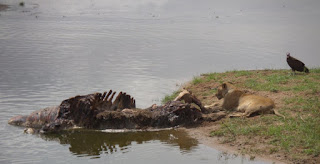 |
| Sunrise over the floating dead hippo |
It all started in the evening when we passed the Great Ruaha River and saw a hippo belly up floating just offshore. It was around 5pm and the hippo had some lacerations which possibly meant it was killed by another hippo. We are deep in the dry season and competition for space is fierce but it is also possible that it was natural causes and the lacerations were caused by a crocodile or other predator trying to break the tough skin. Either way we were hoping that carnivores would find the carcass in the night and if we were early enough we could catch them feasting.
We decided to camp nearby and woke up early the next morning. We reached the location at 5:45am, just as daylight was breaking. We saw a group of seven hyenas struggling to access the carcass. Due to the death in the water and subsequent bloating, the hippo was floating in a small pool. The hyenas were extremely cautious, perhaps afraid of crocodiles. We noticed that a small patch on the upper shoulder had been torn open, presumably by lions. It was strange that the lions didn't seem to be nearby as it's unusual they would leave a kill. It could have been some lone males outside of their territory trying to get a quick meal before more attention was drawn to the carcass? We weren't sure but we sure were enjoying watching the hyenas attempt to mount the hippo. They spent an hour slowly entering the water, approaching, then turning back. At times they came so close to the carcass but none made the plunge. They were literally salivating and we could feel their frustration.
Around 7:00 it looked like the hyenas were giving up and they passed right by our car to return to the bush. However, three hyenas turned back and headed for the carcass again. One immediately went for the carcass and successfully mounted it. The other two tried to latch on but the first hyenas was causing the carcass to float around haphazardly into the deeper section of the pool. Finally they managed to pull it close to the shore and at the same time opened the stomach. A rather unpleasant sound of deflation signaled a free for all and the hyenas rapidly attacked the guts. They pulled out some intestines on the shore and squabbled loudly. I was excited as hyenas squabbling is a sure signal to other predators that a carcass is nearby.
 |
| Spotted hyena |
The hyenas were now completely frustrated and periodically growled at the crocodile. At this point vultures began to land. It started with a few and over the next hour just short of a hundred landed nearby. Five different species were represented, each with it's specialty with their beaks and necks are designed differently. Some are good at tearing apart the open flesh while others can pick around the bones. The hyenas were now having to shift their focus to defending the pile of intestines from the vultures, though they were previously content on letting them sit on the shore.
After some time the hyenas heads perked up and they all looked across the river. They immediately scampered away. We scanned the river bed and saw two lionesses walking slowly across the riverbed. Their gait and confidence was unnerving and impressive. After watching all the previous wildlife slowly approach the carcass and make calculated and cautious moves, the lions just walked right up to the carcass and started going at it. They didn't even take a second glance at the crocodile even though the carcass was clearly in the crocs home turf. All the other predators backed off knowing it was time for the queens to feast.
We finally left the carcass around 11:00am as several safari cars began to arrive. We had the scene to ourselves for the majority of the time with only one other car present on the opposite side of a clearing as the lions came. It was an extremely intimate experience and watching it all unfold was a special experience I won't soon forget.
 |
| Four days later, after eight days it was completely gone. |









